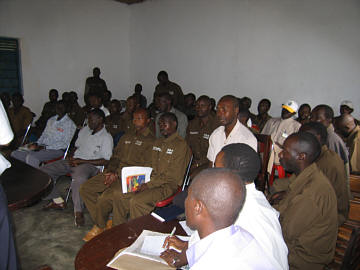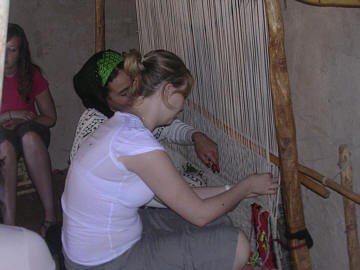Responsible Tourism
As teachers and mountain instructors we at EWP are passionate about the
outdoors and committed to bringing up young people with a love and respect for
the environment. With our teaching days behind us and with 23 years experience
of operating adventure tours our commitment is now fully directed towards
improving the environment for the communities with whom we work. To put into pratice our ideas we have adopted several strategies: - As far as possible we use local people to act in support of our trips.
- We personally get to know our guides and design our trips in conjunction with
them.
- Our own staff in the field are expected to run trips in as sustainable a manner
as possible. For example; not only do they insist on removing their own rubbish
but they will when practicable clean up after other less caring and more
selfish groups. Our aim is always to leave campsites in a better state than we
have found them.
- Discussing with National Park and other authorities problem areas and working
with them to find solutions
- Our staff ensure our clients are given clear guidance on dealing with litter,
toilet issues, on prevention of water pollution, firewood usage and personal
hygiene.
- Discussing with staff and client groups how to interact with local people they
meet, eg with regard to awareness of local customs, introductions, employment,
photography, handling children, gifts.
- Ensuring we use operators who provide good quality of equipment for their staff
and clients and ensure that their staff have acceptable work loads.
- We aim to help charities and organisations working to improve conditions in
overseas areas we are associated with by direct help. Some of the local
community schemes we are currently involved in promoting include:
- We encourage all participants in our trips to follow our Responsible Tourism strategies as outlined above as part of out Booking Conditions.
Whilst we are constantly seeking to improve, it is not possible to achieve all
our goals equally efficiently in all locations. We are continually discussing
with our staff and agents ways of improving our style of operation and we have
policies in place with most of our ground operators. Below is a sample Eco
Tourism policy adopted by us and agents in Tanzania.
EWP Ecotourism (Tanzania)We ask our clients to respect local environments and promote local projects,
products and producers. In particular: - Assist local economies by purchasing local products instead of exotic ones and
to avoid those made from endangered indigenous wood such as ebony or bamba
kofi.
- Avoid purchasing items such as pieces of coral, large shells or turtle shells
which encourage the destruction of the coral reef and ocean fauna.
- Not to remove any natural objects such as flora or sea shells.
- Not to harass wildlife or marine life.
- Not to leave litter. Please take all litter back from the mountains or safaris
unless responsibly disposed of by your trip guides.
- Water is precious - please use it sparingly.
- Respect the customs of the local population. In towns, particular at the coast
or on Zanzibar women are requested to cover their shoulders and wear knee
length skirts or trousers and not to go topless on the beaches where there are
local people. In towns men should not go shirtless.
- Please ask before taking photos of people or private houses.
- Alcohol is freely available but drunken behaviour is offensive.
- Not to give presents of money to children nor to accept services from
unlicensed people.
Where possible we try to help local communities and involve them in our
programs and camps. For this reason porters and guides are recruited from the
locality of the trip being arranged. For example, at Ikoma camp we contribute
to the local Maasai community and this also applies to several other campsites
that we use in Maasai country. We are actively involved in conservation and
development issues in Kilimanjaro National Park and the Ngorongoro Conservation
Area. We support and promote our porters and guides through their association
ensuring they are not exploited and that they are fairly paid. We promote any
organisation that benefits their local community, for example we try to use
accommodation such as is provided by the St Eugene Sisters in Usambara. In 2009 EWP will be contributing to the "Million Mile Challenge". | 
Working with guide and porter associatons

Gifts for children

Organising clean-ups

Teaching English

Finding solutions for preserving bogs (and dry feet)

Learning local skills

Helping provide and check porter and guide equipment |








